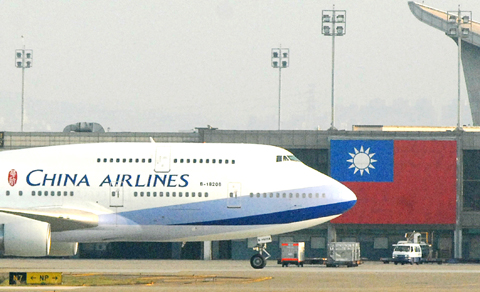Taiwan-based China Airlines (華航), which marks its 50th birthday this week, can look back at half a century of turbulence, but the future could bring even more formidable challenges, analysts said.
While in the past an abysmal safety record was the main problem, now the carrier faces completely different threats from China’s aggressive state-controlled airlines and the region’s nimble low-cost carriers.
“It’s a company that has come through years of external shocks and storms probably shaken, but still fighting,” said Derek Sadubin, an analyst with the Center for Asia Pacific Aviation, a Sydney-based consultancy. “They’ve got the support of the Taiwan government behind them, which has given them a degree of confidence, but it’s an airline that really needs to step up a gear to face the challenges ahead.”

PHOTO: PATRICK LIN, AFP
Starting out on Dec. 16, 1959 with just two World War II-era flying boats, China Airlines has grown into an international carrier with a fleet of 66 modern aircraft.
What has also grown with the company, which is 54 percent owned by a state fund, is a record of spectacular crashes that have made it one of the riskiest carriers in Asia.
Among the more recent, in May 2002 a Boeing 747 smashed into the Taiwan Straits, killing all 225 people on board. Five years later, a Boeing 737 burst into flames while landing in Okinawa, although without fatalities.
A propensity for risk-taking among the carrier’s pilots, who for decades were recruited mainly from the island’s air force, has often been pinpointed as a liability.
“Their staff are more like government employees than their counterparts in other companies,” said Bruce Tsao, a Taipei-based analyst with Capital Securities (群益證券). “It’s an old company with a government background. That mentality may be related to its safety track record.”
The carrier’s reputation for poor safety has forced it to take a series of steps aimed at renewal “from inside out,” said Debbie Wu (吳宜蓁), a public relations expert at Fu-Jen Catholic University in Taipei.
“This ranges from organizational reconstruction to buying new jets and designing new uniforms, and the consumers have noticed the changes,” she said. “The public is forgetful, and the airline has diverted attention from the negative news by creating new topics with these moves. It has successfully turned its image around.”
But one thing has not changed: the company’s name, which dates from a time when Taiwan’s leaders, refugees from communist-controlled China, still claimed to represent all of the country.
China Airlines may in fact be a more apt name now than it has been for a long time because of the enormous opportunities associated with the booming China market.
A thaw in relations between China and Taiwan means the carrier now operates 55 weekly flights to 13 cities in China.
While it faces competitors from both Taiwan and China, the China routes are a sure earner because of rules that exclude foreign airlines.
“Basically, most players in this market are winners,” said Francis Hsiao (蕭義展), a Taipei-based analyst with Grand Cathay Securities (大華證券).

KEEPING UP: The acquisition of a cleanroom in Taiwan would enable Micron to increase production in a market where demand continues to outpace supply, a Micron official said Micron Technology Inc has signed a letter of intent to buy a fabrication site in Taiwan from Powerchip Semiconductor Manufacturing Corp (力積電) for US$1.8 billion to expand its production of memory chips. Micron would take control of the P5 site in Miaoli County’s Tongluo Township (銅鑼) and plans to ramp up DRAM production in phases after the transaction closes in the second quarter, the company said in a statement on Saturday. The acquisition includes an existing 12 inch fab cleanroom of 27,871m2 and would further position Micron to address growing global demand for memory solutions, the company said. Micron expects the transaction to

Vincent Wei led fellow Singaporean farmers around an empty Malaysian plot, laying out plans for a greenhouse and rows of leafy vegetables. What he pitched was not just space for crops, but a lifeline for growers struggling to make ends meet in a city-state with high prices and little vacant land. The future agriculture hub is part of a joint special economic zone launched last year by the two neighbors, expected to cost US$123 million and produce 10,000 tonnes of fresh produce annually. It is attracting Singaporean farmers with promises of cheaper land, labor and energy just over the border.

US actor Matthew McConaughey has filed recordings of his image and voice with US patent authorities to protect them from unauthorized usage by artificial intelligence (AI) platforms, a representative said earlier this week. Several video clips and audio recordings were registered by the commercial arm of the Just Keep Livin’ Foundation, a non-profit created by the Oscar-winning actor and his wife, Camila, according to the US Patent and Trademark Office database. Many artists are increasingly concerned about the uncontrolled use of their image via generative AI since the rollout of ChatGPT and other AI-powered tools. Several US states have adopted

A proposed billionaires’ tax in California has ignited a political uproar in Silicon Valley, with tech titans threatening to leave the state while California Governor Gavin Newsom of the Democratic Party maneuvers to defeat a levy that he fears would lead to an exodus of wealth. A technology mecca, California has more billionaires than any other US state — a few hundred, by some estimates. About half its personal income tax revenue, a financial backbone in the nearly US$350 billion budget, comes from the top 1 percent of earners. A large healthcare union is attempting to place a proposal before